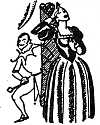 This International Opera House came about as the result of many men:
scientists, inventors and engineers who worked with coils of wire, with
batteries, and electrons - none remotely connected with symphony music.
One of these men was a fellow country-man of Mr. Toscanini's -
Guglielmo Marconi.
This International Opera House came about as the result of many men:
scientists, inventors and engineers who worked with coils of wire, with
batteries, and electrons - none remotely connected with symphony music.
One of these men was a fellow country-man of Mr. Toscanini's -
Guglielmo Marconi.Young Marconi, in 1886, at the age of 12, became interested in the work of Hertz. Hertz found that electrical waves could be sent through space, and Professor Branly invented a wave detector called a "coherer." Marconi was fascinated with these two things and experimented with them. He dreamed of the possibilities of these magic waves carrying messages to ships at sea and even to other continents. His father allowed him to use a room in their home as a laboratory. After putting together some home-made apparatus and using a broom handle to hold up his antenna, Marconi managed to send a signal from one end of the room to the other without using connecting wires! As the years passed, Marconi tried many things. The distances between the transmitter and the receiver became greater and greater. He went to England. After many trials, with the help of Sir William Preece, he sent messages from Salisbury to Bath - a distance of 33 miles! |








